How ironic that English National Opera turned out possibly the two best productions of the year after the Arts Council had done its grant-cutting worst, punishing the company simply, it seemed, for not being the irrationally preferred Royal Opera. And while 2015 has been as good as it gets artistically speaking for ENO, 2016 may well see confirmation of the first steps towards its dismantling by a short-sighted management – for what is a great opera house without a big chorus or a full roster of productions, both elements under threat?
Meanwhile, let’s celebrate the positive. Both the outgoing and the incoming ENO music directors astonished us all in tandem with fine casts, the aforementioned chorus on peak form and two of the most original directors. Richard Jones’s production of Wagner’s The Mastersingers of Nuremberg wasn’t new, as some awards ceremonies wanted us to believe; it had already been acclaimed at Welsh National Opera back in 2010, sung in German. Miraculously, it was just as good this time round, with Iain Paterson as the central character of philosopher-cobbler Hans Sachs neither better nor worse than Bryn Terfel for WNO, just different. Edward Gardner went straight to the lovely soul of the piece within minutes of the Prelude, and stayed there throughout, without ever having conducted this longest of opera scores before. Colleagues on theartsdesk Alexandra Coghlan and Jessica Duchen join me in granting this Mastersingers the laurel crown.
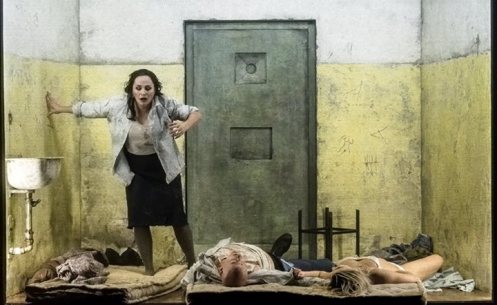 No less an achievement on its own, comfortless terms was ENO’s first production of the 2015-16 season, Shostakovich's Lady Macbeth of Mtsensk, a canny choice for the new musical nerve-centre, Mark Wigglesworth, since he’d conducted it with astonishing depth and impact for the company back in 2001. While David Pountney’s staging then was chaotic and visceral, Dmitri Tcherniakov went for a cooler, more calculated framework that nevertheless provided the right context for the heartbreaking Katerina Izmailova of American soprano Patricia Racette. I’ll never forget the surprising impact of the squalid cell surrounded by a vast blackness at the beginning of the final act (pictured above by Clive Barda) – the sort of unpredictable visionary quality that Tcherniakov at his best shares with Jones.
No less an achievement on its own, comfortless terms was ENO’s first production of the 2015-16 season, Shostakovich's Lady Macbeth of Mtsensk, a canny choice for the new musical nerve-centre, Mark Wigglesworth, since he’d conducted it with astonishing depth and impact for the company back in 2001. While David Pountney’s staging then was chaotic and visceral, Dmitri Tcherniakov went for a cooler, more calculated framework that nevertheless provided the right context for the heartbreaking Katerina Izmailova of American soprano Patricia Racette. I’ll never forget the surprising impact of the squalid cell surrounded by a vast blackness at the beginning of the final act (pictured above by Clive Barda) – the sort of unpredictable visionary quality that Tcherniakov at his best shares with Jones.
Those who expected Mike Leigh to break the mould in directing Gilbert and Sullivan’s The Pirates of Penzance for ENO were disappointed. But this classy, classical act boasted a brilliant cast directed with discipline and well-placed gags which got the required belly laughs. Even more were in supply throughout Sasha Regan’s all-male Pirates, and in pocket Charles Court Opera’s hysterically funny Ruddigore and revived Trial by Jury (Catrine Kirkman's Essex Plaintiff, unsung comedy performer of the year alongside John Savournin's Judge Judy, pictured below) – among the most tear-inducingly witty half-hours I’ve ever enjoyed on the London stage, musical or otherwise.
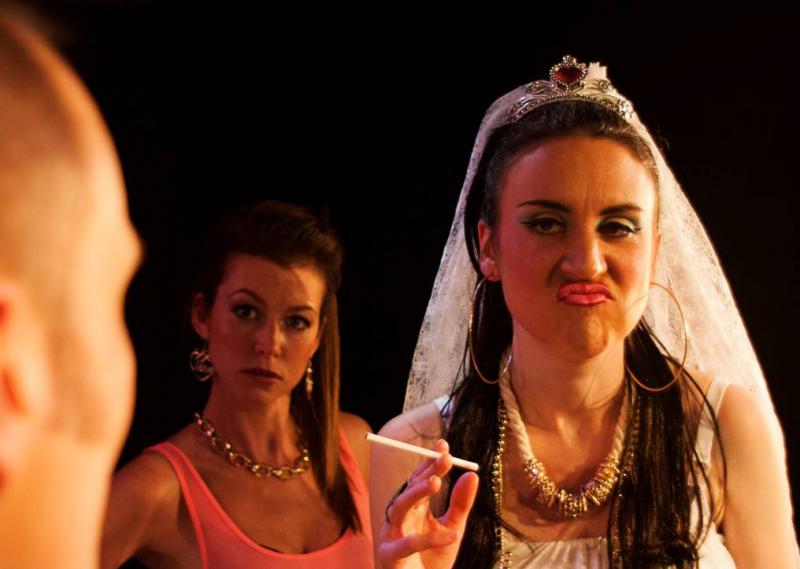 Total works of art like these in the operatic year were more than usual; the art-form demands so much in every quarter that in an average season you’d be lucky to get as many as three. But in terms of dramatic rethinking, excellent cast and orchestral excellence, at least five more deserve to join the list: David McVicar jettisoning the placidity that’s afflicted some of his recent productions in a period-costume yet nevertheless radical Mozart Die Entführung aus dem Serail (The Abduction from the Seraglio) at Glyndebourne with a dislocating third act, thanks especially to the greater than usual significance of the speaking role, Pasha Selim (Franck Saurel). Alexandra was bowled over by director Barrie Kosky’s redemption in Handel’s Saul, also at the Sussex house, while Garsington, top amongst other fine country opera contenders this year, presented an adventurous season with a sparely beautiful Britten Death in Venice at its heart, tenor Paul Nilon reminding us that he’s the natural successor to the music-theatrical hold of the late Philip Langridge (Allan Clayton looks set to take over the mantle soon). Clive Barda takes opera photographer of the year award with his shot of Celestin Boutin's Tadzio and Nilon's Aschenbach, pictured below.
Total works of art like these in the operatic year were more than usual; the art-form demands so much in every quarter that in an average season you’d be lucky to get as many as three. But in terms of dramatic rethinking, excellent cast and orchestral excellence, at least five more deserve to join the list: David McVicar jettisoning the placidity that’s afflicted some of his recent productions in a period-costume yet nevertheless radical Mozart Die Entführung aus dem Serail (The Abduction from the Seraglio) at Glyndebourne with a dislocating third act, thanks especially to the greater than usual significance of the speaking role, Pasha Selim (Franck Saurel). Alexandra was bowled over by director Barrie Kosky’s redemption in Handel’s Saul, also at the Sussex house, while Garsington, top amongst other fine country opera contenders this year, presented an adventurous season with a sparely beautiful Britten Death in Venice at its heart, tenor Paul Nilon reminding us that he’s the natural successor to the music-theatrical hold of the late Philip Langridge (Allan Clayton looks set to take over the mantle soon). Clive Barda takes opera photographer of the year award with his shot of Celestin Boutin's Tadzio and Nilon's Aschenbach, pictured below.
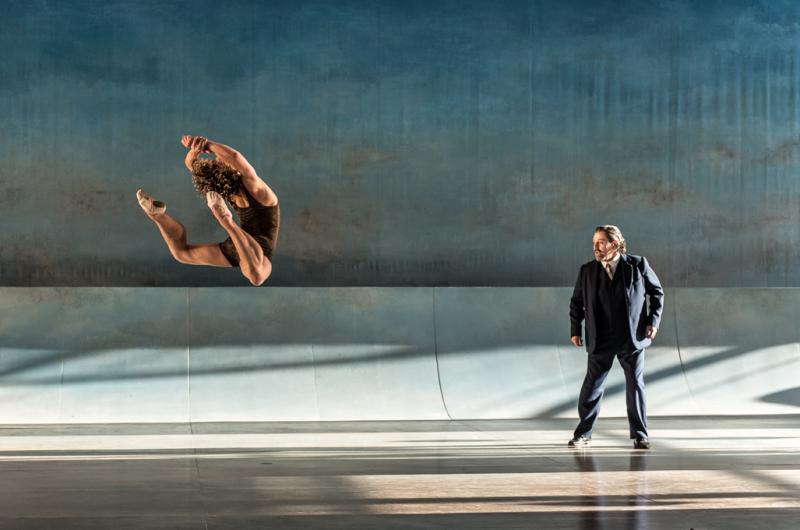 Richard Bratby loved the Buxton concert performance of Charpentier’s Louise, a gem which still needs a full production, ideally at Glyndebourne, and was taken with the cinematic fantasy of English Touring Opera's Tales of Hoffmann. Stephen Walsh found Pountney’s staging of Debussy’s Pelléas et Mélisande at Welsh National Opera another total experience, while we regret that David Kettle hadn’t joined the team when he saw the second Scots production of James MacMillan’s visceral Ines de Castro at the beginning of the year. Graham Rickson has no hesitation in choosing Kiss Me, Kate as the highlight of Opera North’s varied repertoire in 2015.
Richard Bratby loved the Buxton concert performance of Charpentier’s Louise, a gem which still needs a full production, ideally at Glyndebourne, and was taken with the cinematic fantasy of English Touring Opera's Tales of Hoffmann. Stephen Walsh found Pountney’s staging of Debussy’s Pelléas et Mélisande at Welsh National Opera another total experience, while we regret that David Kettle hadn’t joined the team when he saw the second Scots production of James MacMillan’s visceral Ines de Castro at the beginning of the year. Graham Rickson has no hesitation in choosing Kiss Me, Kate as the highlight of Opera North’s varied repertoire in 2015.
The opera I’d been most eagerly anticipating on stage, Nielsen’s Saul and David, was absent from the UK stage in the 150th anniversary year of the composer’s birth; Pountney’s production for the Royal Danish Opera in Copenhagen on the very birthday, 9 June, didn’t convince me that it’s more than a static oratorio, but what inspired material, effortlessly convincing under the baton of Michael Schønwandt with Johan Reuter searing as the mentally unwell king. Generous-spirited Dane Kasper Holten, announcing his departure from the Royal Opera rather sooner than we'd like, but for admirable family reasons, made a good choice of world premiere on the main stage in Georg Friedrich Haas’s Morgen und Abend, a first airing which made enough of an impact to suggest that this unusual vision of birth followed by death will live in the repertoire (though both dramaturgy and music divided opinion).
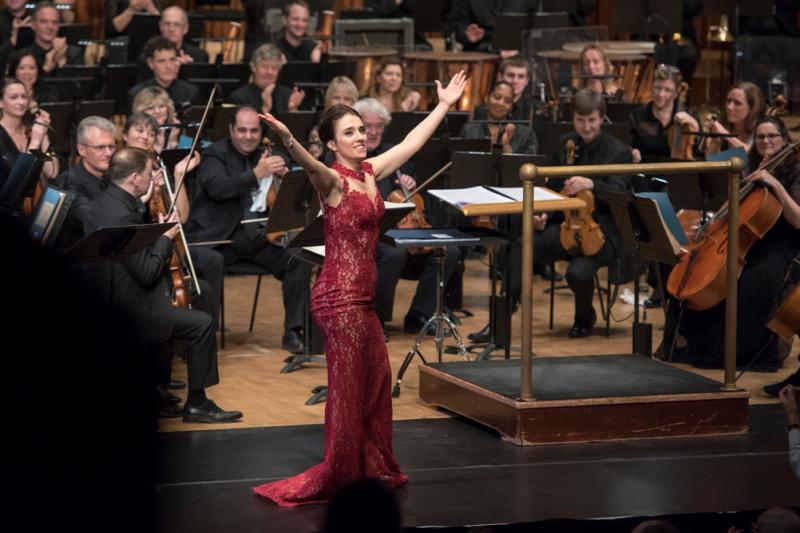 Star performances, often in less than perfect evenings, were abundant. Five sopranos made a huge impact, two in their London debuts. At ENO we discovered that rare breed, a lyric-dramatic singer who can scour the soul with her dramatic urgency: American Tamara Wilson dazzled as Leonora in Calixto Bieito’s very uneven production of Verdi’s dramatically awkward The Force of Destiny. Australian Nicole Car found all the right dramatic truth as Tchaikovsky’s Tatyana in Holten’s initially disliked Royal Opera Eugene Onegin (overall, I still liked it more the first time). Albanian soprano Ermonela Jaho chewed the carpet in a good way as Leoncavallo’s Zazà (pictured above by Russell Duncan) in a bewitching semi-staged performance at the Barbican, idiomatic Maurizio Benini conducting a seemingly very happy BBC Symphony Orchestra. Fflur Wyn showed charm and coloratura ease as Delibes' Lakmé, well partnered by tenor Robert Murray at Holland Park – ravishing score perfectly executed, inept production. Another French treasure, Massenet's Le roi de Lahore, finally appeared in concert with Royal Opera Jette Parker Young Artist Anush Hovhannisyan getting into her stride courtesy of Chelsea Opera Group, who finally made amends for a major omission from Wagner anniversary year with Wagner's early clunker Das Liebesverbot.
Star performances, often in less than perfect evenings, were abundant. Five sopranos made a huge impact, two in their London debuts. At ENO we discovered that rare breed, a lyric-dramatic singer who can scour the soul with her dramatic urgency: American Tamara Wilson dazzled as Leonora in Calixto Bieito’s very uneven production of Verdi’s dramatically awkward The Force of Destiny. Australian Nicole Car found all the right dramatic truth as Tchaikovsky’s Tatyana in Holten’s initially disliked Royal Opera Eugene Onegin (overall, I still liked it more the first time). Albanian soprano Ermonela Jaho chewed the carpet in a good way as Leoncavallo’s Zazà (pictured above by Russell Duncan) in a bewitching semi-staged performance at the Barbican, idiomatic Maurizio Benini conducting a seemingly very happy BBC Symphony Orchestra. Fflur Wyn showed charm and coloratura ease as Delibes' Lakmé, well partnered by tenor Robert Murray at Holland Park – ravishing score perfectly executed, inept production. Another French treasure, Massenet's Le roi de Lahore, finally appeared in concert with Royal Opera Jette Parker Young Artist Anush Hovhannisyan getting into her stride courtesy of Chelsea Opera Group, who finally made amends for a major omission from Wagner anniversary year with Wagner's early clunker Das Liebesverbot.
Other stars of the year are even younger, and I can’t remember a better time for talent pouring out of the music colleges. In student productions, mezzo Kezia Bienek, Callas-like in temperament, and tenor Gyula Rab excelled in one of the two casts for the Royal College of Music’s totally accomplished staging of Handel’s delightful pasticcio Giove in Argo, while a chance to see Wolf-Ferrari’s patchily inspired comedy Le donne curiose (aka The Nosy Wives of Venice) very humorously staged at the Guildhall School was enriched by a natural Welsh lyric tenor, Elgan Thomas (pictured below with Nicola Said by Clive Barda).
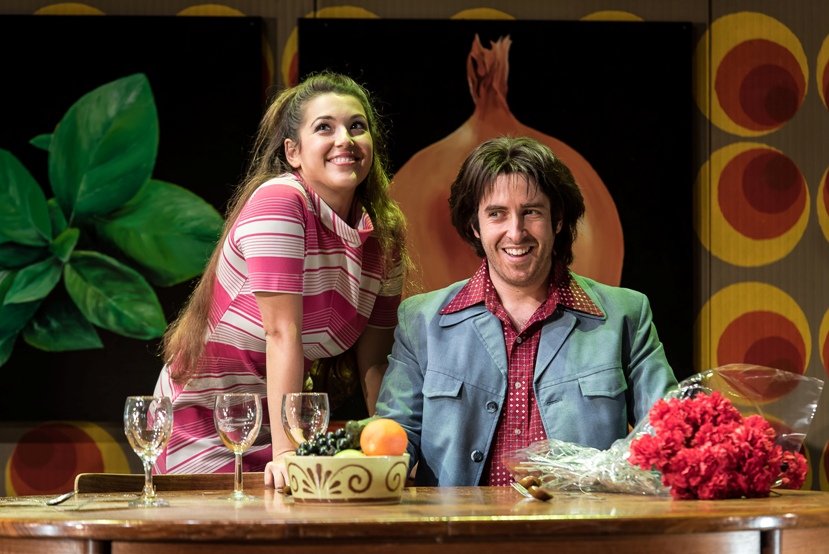 Already one of our finest lyric sopranos, Louise Alder has been mostly hidden from UK sight taking on principal roles at Frankfurt Opera in her first year out of music college, but we got to see her in a revelatory 17th century Orpheus, Luigi Rossi’s, at the Sam Wanamaker Playhouse. And while bass-baritone Ashley Riches wasn’t allowed to characterise much as Schaunard in the major disappointment of ENO’s drug-fuelled Bohème, he slips in by virtue of an exceptionally vivid oratorio performance in the last major event of the year, the Academy of Ancient Music’s complete Bach Christmas Oratorio. So I can end by reproducing the same phrase I used at the beginning of the classical concerts “Best of 2015”, as far as younger artists are concerned, at least: the musical future looks bright indeed.
Already one of our finest lyric sopranos, Louise Alder has been mostly hidden from UK sight taking on principal roles at Frankfurt Opera in her first year out of music college, but we got to see her in a revelatory 17th century Orpheus, Luigi Rossi’s, at the Sam Wanamaker Playhouse. And while bass-baritone Ashley Riches wasn’t allowed to characterise much as Schaunard in the major disappointment of ENO’s drug-fuelled Bohème, he slips in by virtue of an exceptionally vivid oratorio performance in the last major event of the year, the Academy of Ancient Music’s complete Bach Christmas Oratorio. So I can end by reproducing the same phrase I used at the beginning of the classical concerts “Best of 2015”, as far as younger artists are concerned, at least: the musical future looks bright indeed.

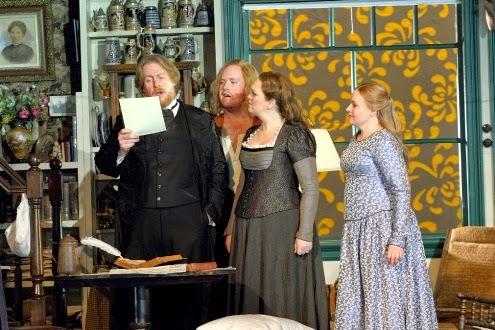












Add comment